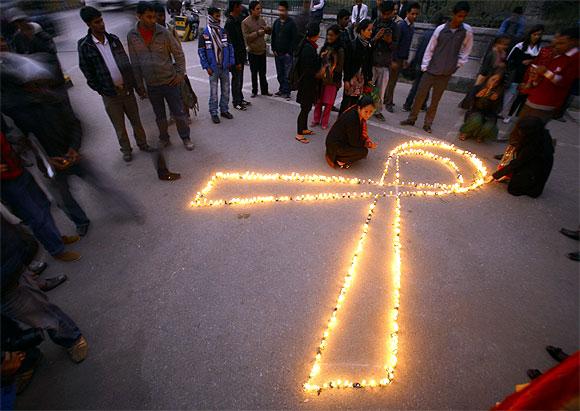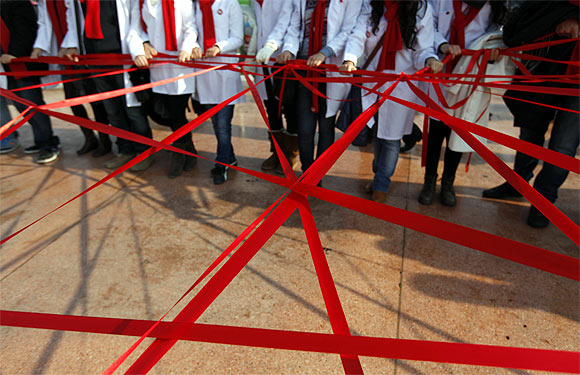
The global community is in a position to eradicate AIDS, but funding will be critical to future progress, United Nations Secretary General Ban Ki-moon has said as the fight against endemic entered into its fourth decade.
"The progress we have made so far is proof that we can realise our vision of zero new HIV infections, zero discrimination and zero AIDS-related deaths," Ban said in his message for World AIDS Day, observed on December 1 each year. The theme of this year's World AIDS Day is 'Getting to Zero.'
He said the number of new HIV infections has fallen by more than 20 per cent since 1997. In sub-Saharan Africa, the region most affected by the AIDS epidemic, HIV incidence has decreased in 22 countries.
Click NEXT to read further...

"Momentum is on our side. Let us use it to end AIDS -- once and for all," he said. Ban said access to HIV prevention services are helping young people, sex workers and transgender people to take control of their health for greater well-being.
He said 2.5 million AIDS-related deaths have been averted due to treatment since 1985. Last year alone, 700,000 lives were saved and millions of people, particularly in low and middle-income countries, are receiving treatment.

The United Nations General Assembly's high-level meeting on AIDS is targeting that by 2015, sexual transmission of HIV be reduced by half, new infections in children are eliminated and treatment is provided to 15 million people living with HIV.
"With strong political will, reasonable financial resources and a firm human rights-based approach, we can achieve all of these targets," he said.
Ban urged the countries to act on the investment framework put forward by UNAIDS and to fully fund the global investment target of up to 24 billion dollars annually.

President of the UN General Assembly Nassir Abdulaziz Al-Nasser said the challenges ahead in eliminating AIDS are "sobering".
While more than 6.5 million people now receive life-saving treatment, 7.6 million still have no access to it.
In 2010 alone, 1.8 million people died of AIDS-related illnesses, and there were 2.7 million new HIV infections.
"We cannot allow hard-won gains to unravel," Al-Nasser said. "I call on all stakeholders to uphold their commitments, and to work together to sustain and accelerate the progress."

Michel Sidibe, executive director of the joint UN programme on HIV/AIDS (UNAIDS), said despite the economic downturn that has stretched the AIDS response to its limits, millions of lives have been saved, as HIV treatment and prevention efforts continue to show results.
"Never before in the history of AIDS have we reached a moment where we are able to stand up and say with conviction the end of AIDS is in sight," he said.
"The road before us is clear and we can accelerate ahead with smart investments, capitalising on scientific advancements and evidence and respecting human rights," Sidibe said, calling on countries, donors and others to reach the global investment target of USD 22-24 billion for the AIDS.